The United States Air Force depends on their Aircraft Loadmasters to properly load, secure, and escort both passengers and supplies on each Air Force aircraft that takes flight.
These enlisted women and men custom-load the aircraft before each flight.
They are responsible for not only providing for the comfort and well-being of passengers during their flight but Aircraft Loaders also calculate proper weight distribution to ensure the flight meets both Federal Aviation Administration (FAA) and Air Force regulations.
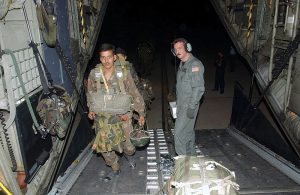
Air Force Aviation Loadmasters ensure the security and safety of everything and everyone onboard all Air Force flights.
Jump To A Section
Requirements and Qualifications
To become an Aircraft Loadmaster in the United States Air Force there are specific requirements and qualifications one must meet, which include:
- Must be a member of the US Air Force.
- Must be between the ages of 17 and 39.
- Must have normal depth perception.
- Height must be no less than 64 inches and no more than 77 inches.
- Completion of a National Agency Check, Local Agency Checks, and Credit Checks.
- Must have an Armed Forces Vocational Aptitude Battery (ASVAB) score of at least 57.
- Must be able to lift 70 pounds or more.
- Must meet the qualifications for aviation service according to AF 11-402 (Aviation and Parachutist Service, Aeronautical Rating and Badges).
Training and Career Path
Prior to becoming an Air Force Aircraft Loadmaster, you must successfully complete the Air Force Basic Military Training course, commonly referred to as Boot Camp.
Air Force BMT
All airmen attend Boot Camp at Lackland Air Force Base in San Antonio, Texas.
Air Force Basic Military Training Video
Air Force Military Training is seven and a half weeks in duration. However, recruits enrolled in the Delayed Entry Program (DEP) gain an edge in preparing for Air Force Boot Camp by learning many of the military fundamentals with their Air Force recruiters.
Additionally, recruiters work with the fledgling recruits on preparing for the physical rigors they will encounter in basic training.
The Air Force segments into weeks, from Zero Week to Week 7. Recruits, over time, have given each week a special nickname that best describes the week.
For example, Week One is commonly referred to as Sneaker Weak, as recruits are not yet issued boots, and must wear tennis shoes with their uniforms.
Week 6 is known as BEAST week for Basic Expeditionary Application Skills Training Week.
During BEAST Week, recruits prepare for mock deployment, live in tents, eat Meals Ready to Eat (MREs), and train for current combat environments.
Skills and fundamentals taught during the rigorous seven-and-a-half weeks of Air Force basic training include:
- Physical Conditioning
- Basic Marching and Drill Movements
- Weapons Handling and Maintenance
- Law of Armed Conflict
- Reporting and Saluting
- Flight Formation
- Temper Tent Training
- Mental Preparation for Combat
- Formal Retreat
- CPR Certification
- Code of Conduct
- Nuclear Biological and Chemical Training
- M9 (9MM) Pistol Training
- Military Citizenship
- Air Force History and Organization
- Combat Stress Recovery
- Joint Warfare
- Ethics
- Combat Stress Recovery
Please note that this list is but a basic overview of the skills taught during BMT and is not all-inclusive.
More detailed information about Air Force Basic Training is available here.
Aircraft Loadmaster Courses
After BMT, Air Force Aircraft Loadmasters must complete the Aircrew Fundamentals Course also at Lackland Air Force Base.
The duration of the course is two weeks long.
Upon successful completion of the Enlisted Aircrew Undergraduate Course, airmen then immediately move on to survival training.
Air Force Aircraft Loadmasters must complete the 17-day Combat Survival Training Course at Fairchild Air Force Base, WA, followed by a 4-day Water Survival-Parachuting Course which is conducted at Pensacola Naval Air Station, FL.
Then they move on to the Basic Loadmaster Course (BLM). This course is conducted at either Altus Air Force base in Oklahoma, or Little Rock, Arkansas, and lasts 5 weeks.
Upon completing this course, Airmen earn the Air Force Specialty Code (AFSC) 1A2X1.
Finally, you go to your aircraft-specific course, location is dependent on the type of aircraft that you will be assigned to and includes:
- C-130 – Little Rock Air Force Base, Arkansas
- C-17 (For Loadmaster airdrop and instructors) – Altus Air Force Base, Oklahoma
- EC-130J – Harrisburg Air National Guard Base, Pennsylvania
- HC-130J – Kirtland Air Force Base, New Mexico
- MC-130H – Hurlburt Field, Florida
- MC-130J: Kirtland Air Force Base, New Mexico
Air Force Aircraft Basic Loadmaster Graduation Video
Aircraft-specific training for Air Force Aircraft Loadmasters varies but generally is twelve weeks long.
Once an Air Force Aircraft Loadmaster has successfully completed all of their initial training, possible duty stations they may be assigned to include:
- Charleston AFB, SC – C17
- Davis Mothan AFB, AZ – HC130P
- Dover AFB, DE – C5
- Dyess AFB, TX – C130
- Eglin AFB, FL – MC130P
- Emendorf AFB, AK – AC130
- Hurlburt AFB, FL – AC130
- Little Rock AFB, AR – C130
- McCord AFB, WA – C17
- Mildenhall RAF, England – MC130P
- Moody AFB, GA – HC130P
- Travis AFB, CA – C5
- Ramstein AB, GE – C130J
- Yokota AB, Japan – C-130J
- Kadena AB, Japan – MC-130J
How Much Are Air Force Aircraft Loadmasters Paid?
Pay for an Air Force Aircraft Loadmaster is identical to all other enlisted personnel (in all branches), based on an airman’s rank and length of service.
| Rank | Monthly Pay (per month) |
|---|---|
| E-1 Airman Basic +4 months | $1,917 |
| E-2 Airman | $2,149 |
| E-3 Airman First Class | $2,259 |
| E-4 Senior Airman | $2,503 |
| E-5 Staff Sergeant | $2,730 |
| E-6 Technical Sergeant | $2,980 |
| E-7 Master Sergeant | $3,445 |
Air Force Aircraft Loadmasters may be entitled to other forms of compensation including basic allowance for housing (BAH), basic allowance for subsistence (BAS), and other forms of compensation such as hazardous duty pay if eligible.
What’s Life Like as an Air Force Aircraft Loadmaster?
Life as an Air Force Aircraft Loadmaster can sometimes be stressful due to high operations tempo and frequent missions.
Air Force Aircraft Loadmasters discuss their job.
Aircraft Loadmasters perform a variety of duties, including:
- Perform visual inspections and operation checks on loading systems prior to loading cargo onto the aircraft.
- Accomplish loading and off-loading aircraft functions.
- Complete weight and balance calculations.
- Review the load manifests prior to the cargo load.
- Provide for the safety and comfort of passengers and troops.
- Ensure security of cargo, mail, and baggage during flight.
- Supervise cargo/passenger loading and offloading activities.
- Demonstrate use of life support equipment.
- Perform aircrew functions and mission-specific qualification duties, such as the airdrop of personnel and cargo.
There are a great many benefits afforded to Air Force Aircraft Loadmasters.
These include opportunities to travel and see the world, advanced educational benefits, unlimited opportunities for advancement, control over your career, and 30 days of paid vacation, annually.
The Loadmasters – Delivering Troops and Cargo Across the Globe
Reviews of current and prior Air Force Aircraft Loadmasters on Indeed.com are glowing:
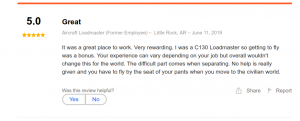
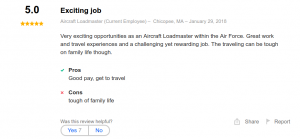
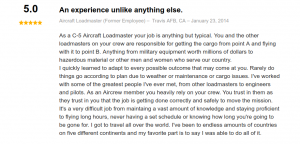

The average rating for Air Force Aircraft Loadmasters on Indeed.com is 4.5 out of a possible 5.
Civilian Career Opportunities
Civilian Career Opportunities are plentiful for an Air Force Aircraft Loadmaster.
The experience of moving people and cargo makes an Air Force Aircraft Loadmaster an often sought-after job candidate.
Companies that specialize in delivery, such as UPS, FedEx, and DHL often seek to hire Aircraft Loadmasters.
Many Air Force Aircraft Loadmasters find opportunities within the railroad industry.
With the education and benefits received while on active duty, still other Air Force Aircraft Loadmasters opt for opportunities in government services.
According to www.payscale.com, the average annual salary for an Air Force Aircraft Loadmaster is $52,159 along with a $3,000 bonus.
If you are considering joining the Air Force, why not give serious consideration to a career as an Air Force Aircraft Loadmaster? You will learn a valuable skill, travel the world, and perform a vital service to your country.
References
AF Loadmaster Career Field Education & Training Plan
- Ikon Pass Military Discount: Learn How To Save Big - January 31, 2025
- RTIC Military Discount: Find Out How To Save Big on Gear - January 30, 2025
- Traeger Military Discount: Learn How To Save Big on Smokers - January 28, 2025

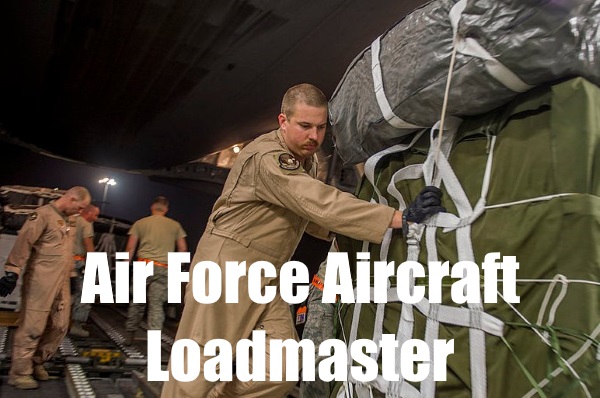



Thanks for the information! Have not booked a job, this was my #1!
Glad to help Cole!
I was a loadmaster on a C5 jet cargo aircraft stationed at Dover AFB in Dover, Delaware. It was a great job. Balancing and loading the aircraft to insure it flys with a properly loaded center of gravity. You must get through basic loadmaster tech school. Next you go to advanced loadmaster school( The plane you are assigned to. Last and probably not least is survival school. Unfortunately, sometimes planes crash and seeing as we fly all over the world, you must be able to survive in different environments, weather, terrain, temperatures, etc. To make along story short, I considered it to be a dream job. A soldier could do a lot worse. Believe me.